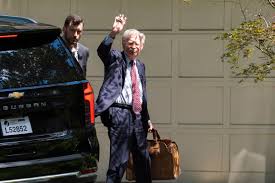Classified Chaos: The John Bolton Document Scandal
Could decades of national security experience leave behind documents so sensitive they still threaten current U.S. defense protocols?
That unsettling possibility became reality when federal agents uncovered classified materials—some referencing weapons of mass destruction—in the downtown Washington, D.C. office of former National Security Adviser John Bolton.
What began as a quiet investigation into possible mishandling of national defense information has now grown into a major legal and political storm.
The implications? Profound. The case raises sharp questions about how former senior officials handle government secrets, and whether old service justifies the possession of dangerous information long after leaving office.
The Seizure and Search
On August 22, FBI agents executed a search warrant at Bolton’s private office in D.C. What they found sent shockwaves through national security circles:

Documents marked “secret” and “confidential”
Memos related to U.S. diplomatic strategy
Materials referencing weapons of mass destruction
Strategic communications documents
Several laptops and other electronic devices
A parallel search at Bolton’s Maryland home recovered more electronic devices and folders—some labeled with references to the Trump administration—but no classified material was confirmed there.
Authorities believe Bolton may have knowingly or negligently retained national defense documents, a potential violation of the Espionage Act. The Justice Department is now exploring possible felony charges.
The Espionage Angle
Although the term often conjures images of spies and double agents, the Espionage Act is frequently used in cases of unauthorized retention of classified materials. The law doesn’t require that the information be shared with foreign powers—just mishandled in a way that endangers U.S. security.
Key concerns in Bolton’s case include:
His past senior-level access to top-secret material during the Bush and Trump administrations
The potential intelligence value of the documents if compromised
A hacked AOL email account Bolton used during his government service
Prosecutors argue that even decades-old information—especially about nuclear strategies or weapons systems—can remain highly sensitive and valuable to foreign adversaries.
Bolton’s Defense
Bolton’s legal team insists there’s no crime here. His lawyer claims:
The documents were either cleared through pre-publication review (related to his memoir) or
Were deemed non-sensitive at the time of his departure from government
The case is being politicized due to Bolton’s fallout with Donald Trump and his public criticisms of the former president
Bolton has also suggested the seized materials were leftover files from a long career in public service, not hidden secrets or active threats.
Political Undercurrents
This isn’t Bolton’s first brush with controversy over classified information. His 2020 memoir, The Room Where It Happened, was nearly blocked by the Trump administration for allegedly revealing classified material. A federal judge at the time warned that Bolton may have exposed himself to criminal liability.
Now, under a different administration, the legal consequences may finally catch up—if investigators find evidence that the documents in his possession were knowingly retained or improperly stored.
Complicating matters, Bolton has become a polarizing figure on both sides of the political spectrum: once a hardline conservative and Trump ally, now a sharp critic of the former president’s foreign policy and conduct.
Why It Matters
This case cuts deeper than political drama or personal rivalry. It highlights a systemic issue with how the U.S. government handles transitions of power, classified records, and post-service accountability.
Key takeaways:
Old documents can still be dangerous: Information about nuclear capabilities or foreign alliances doesn’t lose its sensitivity with time.
Senior officials aren’t exempt from the rules: The laws governing classified material apply equally to the president, advisers, and agency staff.
Lax oversight invites risk: Without a rigorous system for document auditing and retrieval, sensitive material can remain in unsecured spaces for years.
Conclusion
The discovery of classified records in John Bolton’s office is more than an embarrassing footnote in a long political career—it’s a test of how seriously America takes the handling of its most sensitive secrets. If Bolton knowingly kept these documents outside secure channels, he could face felony charges similar to those brought against others in recent high-profile cases.
Whether or not criminal charges are filed, the message is clear: past service doesn’t excuse present risk. In a world where information is power, even one mishandled folder can carry consequences with global implications. As national security agencies assess the damage, the case of John Bolton may become a defining moment in the evolving debate over transparency, accountability, and trust at the highest levels of government.
